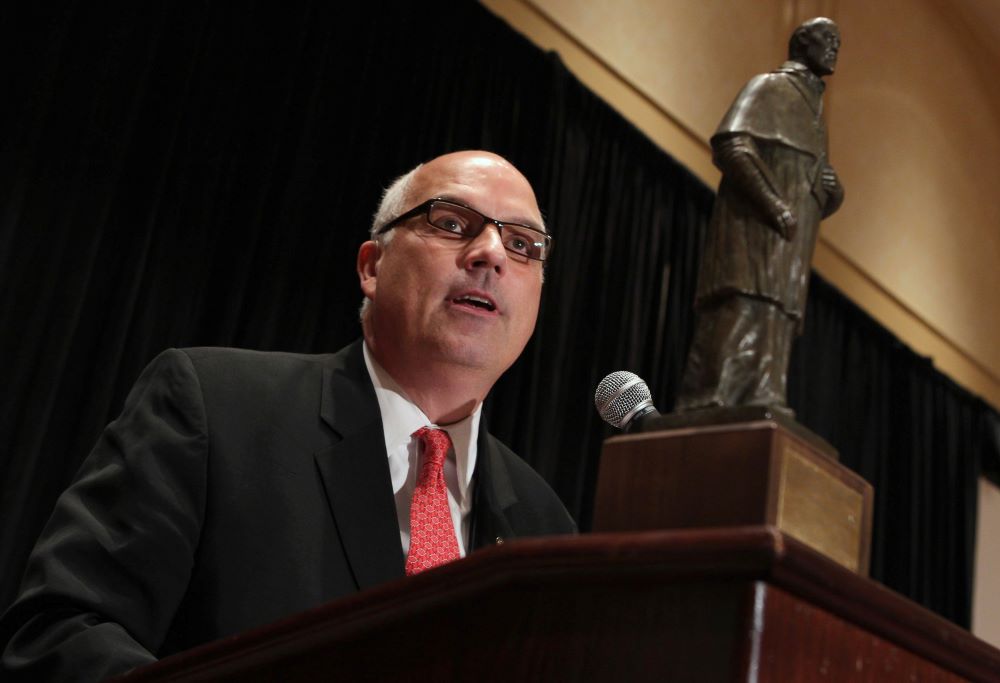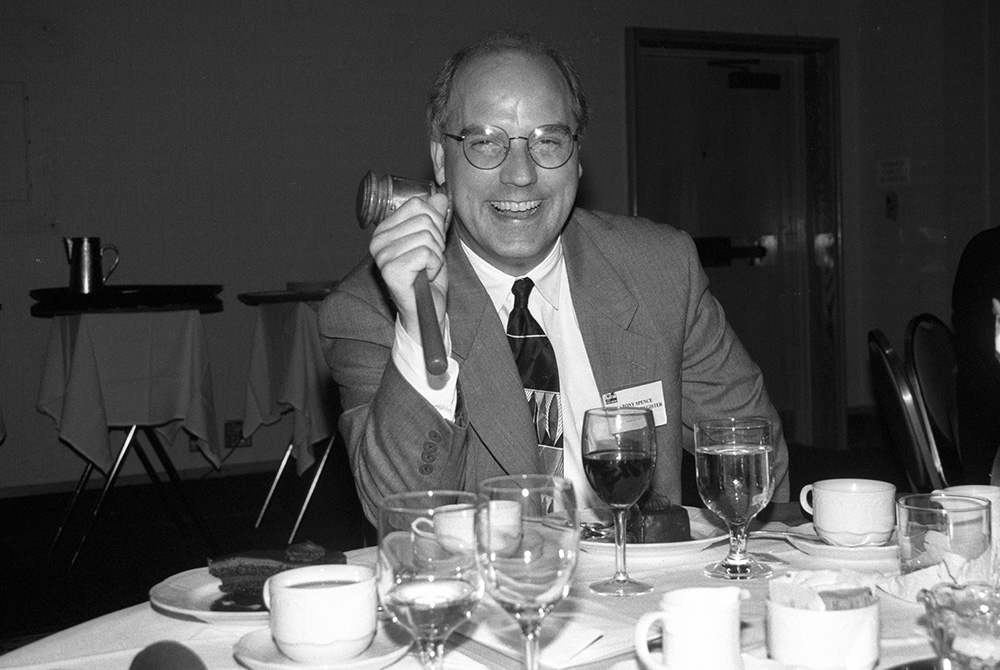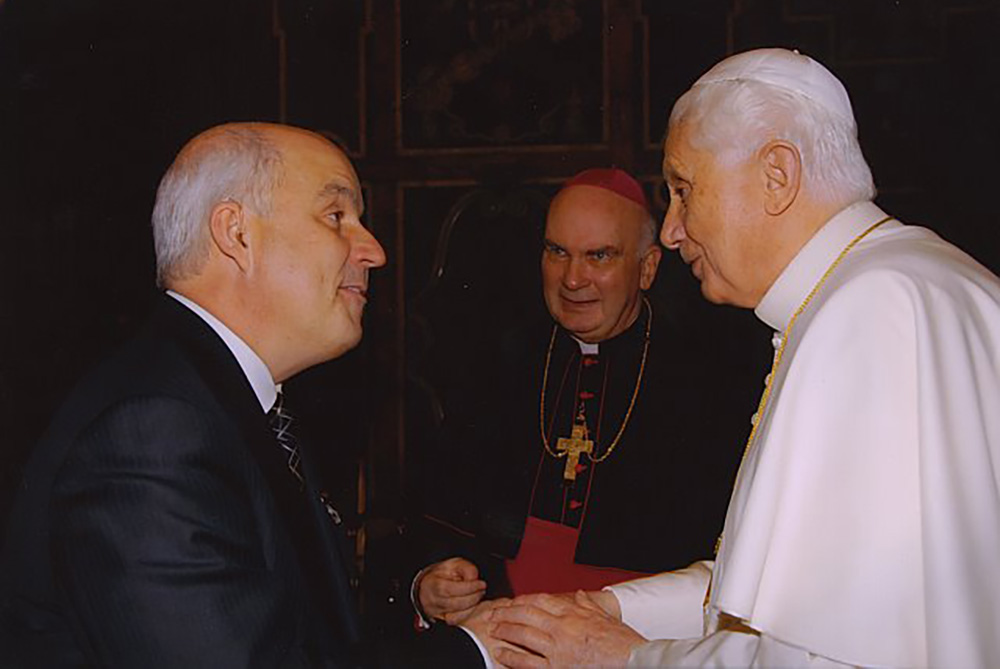
Tony Spence, former director and editor-in-chief of Catholic News Service and a former president of the Catholic Press Association, died July 28 after long illness. He is pictured accepting the 2010 St. Francis de Sales Award, the association's highest individual honor given for outstanding contributions to Catholic journalism. (OSV News/Nancy Wiechec)
Editor's note: Carol Zimmermann, NCR's news editor, was a national reporter at CNS during the 12 years Tony Spence was its director and editor-in-chief.
In many ways, Tony Spence never really left Nashville, Tennessee.
The Southern city with the small-town feel where Spence was born in 1952 and where he died July 28, was a big part of who he was even during his 12 years in Washington, D.C., as director and editor-in-chief of Catholic News Service, a news agency owned by the U.S. bishops that now operates only in Rome.
His Nashville roots came across in his Southern charm, often-used expressions and pride in talking about "back home." He went to Catholic elementary and high school in the Music City and finished college there. It's also where he started his journalism career and where he returned when his work abruptly ended. Fittingly, his Aug. 9 funeral Mass at St. Henry parish was just a few blocks from where he had recently lived.
Fr. Pat Kibby, a senior priest at St. Henry who celebrated the Mass, told the congregation something they no doubt already knew: "When Tony made a friend, he didn't lose them." The priest, who not surprisingly had been a close friend of Spence's for almost 50 years, added that "Tony was better at working a room than any politician running for office."
But he also noted the challenges Spence had faced in recent years, especially with his health, saying: "His life is a reminder that there are times when life comes at us," adding that even through his struggles Spence always maintained his enduring sense of humor.
'I'm so appreciative of the friendship that we had and also for what those of us who knew him and loved him had together.'
—Anthea Butler
In the eulogy, another longtime friend, Anthea Butler, professor of religion and chair of the University of Pennsylvania's Department of Religious Studies, stressed Spence's wit and keen observations and also spoke of his ability to connect with people.
"I'm so appreciative of the friendship that we had and also for what those of us who knew him and loved him had together," she said.
The congregation gathered to celebrate Spence, who died at the age of 71 after a series of health challenges that included several years of unsuccessfully waiting for a kidney transplant.
Although Nashville was always in his heart, Spence's decades-long career and leadership roles in Catholic media, brought him in touch with reporters and editors from around the country and the world. He encouraged and mentored many of them and befriended them all — something that many of the tributes to him on social media since his death have echoed. Colleagues from recent years and back to his first job have spoken of his kindness and sense of humor, but also his determination to objectively deliver the news.
Spence often liked to say "You just can't make this stuff up," about some news items. He also understood and appreciated the nuances of Catholic news, but beyond that he had a genuine thirst for news about people's everyday lives and never failed to ask colleagues about their family members or friends, particularly if he knew they were going through a hard time.
Advertisement
When he started in Catholic journalism at the Tennessee Register, Nashville’s diocesan newspaper, he gave himself a year, figuring he would move on to something else. But that deadline came and went and Spence never looked back. When he received the St. Francis de Sales Award from the Catholic Press Association in 2010, the group's highest individual honor for outstanding contributions to Catholic journalism, he said it had not taken him long to realize this work was "much more than a job," describing it as a vocation that he truly loved.
Spence was editor-in-chief and general manager of the Tennessee Register and had also been its associate and managing editor and served a few years as the diocese's communications director.
He served as president of the Catholic Press Association, (since renamed the Catholic Media Association), co-founded the Appalachian Press Project of Kentucky and Tennessee, chaired the liaison committee with CNS and organized the group's 1998 convention in Nashville. He also served on the communications committee for the U.S. Conference of Catholic Bishops and was a member of the advisory board for its Catholic Communication Campaign.
In the years before taking over the helm of Catholic News Service — which provided daily news and photos to Catholic publications throughout the world, including NCR — Spence also worked in the communications office at his alma mater, Vanderbilt University, in Nashville.
During his CNS tenure, which began in 2004, he led his staff through coverage of a deadly tsunami in Sri Lanka, Hurricane Katrina and its aftermath, three U.S. presidential elections, two U.S. papal visits, the death of Pope John Paul II, and the elections of Pope Benedict and Pope Francis.
Spence oversaw the CNS bureaus in Washington, New York and Rome and helped the news service adapt to a changing media landscape that was no longer solely print based. He also expanded the reach of Catholic news globally with partnerships with news agencies around the world and helped other religious news services get started such as Présence in Montreal and a Catholic news service for Africa based in Nairobi, Kenya.
Spence was a consultant to the Pontifical Council for Social Communications, president of SIGNIS North America and on the board of SIGNIS International, a Catholic lay ecclesial movement for communication professionals.

Tony Spence holds a gavel as president of the Catholic Press Association during a convention. (Courtesy of Tennessee Register)
Spence resigned from his CNS position in 2016 at the request of a U.S. bishops' conference official, shocking his co-workers and many in the Catholic press.
NCR's coverage notes that in the days prior to his resignation, Spence had been attacked by the conservative Catholic groups of Lepanto Institute, LifeSiteNews and the now-defunct Church Militant for tweets he had posted about controversial religious freedom bills in North Carolina and Georgia. The groups accused Spence of "promoting the LGBT agenda" and strongly campaigned that he be ousted from his job and excommunicated from the church.
The U.S. Conference of Catholic Bishops did not give a reason for Spence's departure. James Rogers, chief communications officer for the bishops' conference, told NCR at the time that Spence had "stepped down."
The web-based publications that campaigned against Spence have frequently targeted Catholic Relief Services and the Catholic Campaign for Human Development.
Four years after leaving CNS, a place where Spence intended to finish his career on his own timing, he was interviewed by the news agency in a series for its 100th anniversary where he said CNS "has staying power," because of its photos, stories and the "quality of its reporting."
"CNS is one of the largest and certainly the oldest religious news gathering organizations in the world and because of that it is held in very high esteem around the world by other journalists, Catholic leaders and thought leaders," he said.
Three years later, the U.S. bishops closed the domestic bureaus of the news service, leaving only CNS Rome in operation.

Tony Spence, as editor and chief of Catholic News Service, meets with Pope Benedict XVI in Rome along with Archbishop John Foley who had been president of the Pontifical Council for Social Communications. (Vatican Media)
Several of Spence’s former CNS colleagues — who remember how he encouraged or befriended them, often sharing New Yorker cartoons from his daily calendar or bringing boxes of Krispy Kreme donuts for the newsroom — are planning a memorial Mass for their former boss in September in Washington.
Numerous colleagues have posted tributes to Spence on X and Facebook. Lynn Williams said on X, the social media platform formerly known as Twitter, "I adored Tony. He was my editor at the Tennessee Register and always my go to guy for the inside story of any type."
And Beth Matter, a former editor at Vanderbilt University, said on Facebook that Spence was one of her favorite bosses. "He was a wonderful leader and encouraged our gang of quirky magazine editors at Vanderbilt to soar and be our most creative selves. I learned so much from him, not the least of which was how to handle difficult people. We not only excelled as a team, but we had fun."
NCR spoke with two Catholic editors who worked with Spence, including Patrick Downes, retired editor of the Hawaii Catholic Herald, diocesan newspaper of Honolulu, and Karen Franz, general manager and editor of the Catholic Courier, diocesan newspaper of Rochester, New York.
Downes, who met Spence in 1983 when both were new editors, described Spence as "gracious, generous, congenial and welcoming, whether talking shop or chatting about our families. But he was like that with everyone. He smiled when he spoke."
Franz had a similar observation, calling Spence "a wonderful friend who, no matter how busy he was, always took time to genuinely engage with those he encountered."
A tribute to Spence on the funeral home's website summarizes what many have expressed since his death. Angela Zukowski, director of the Institute for Pastoral Initiatives at the University of Dayton, said she met Spence when the Catholic Press Association and the Catholic Association for Radio and TV worked together.
She described him as "a faithful and compassionate friend to all who called him a friend. He radiated what it means to be an authentic, faithful Catholic communicator in changing times."
Zukowski said Spence was bold and courageous. "We will miss our friend, but remember his faith, passion, compassion, and vision for the future."






